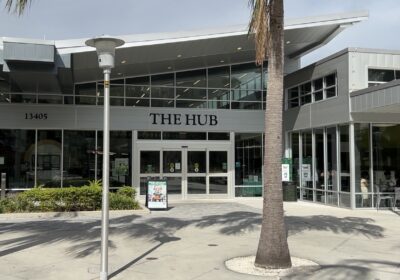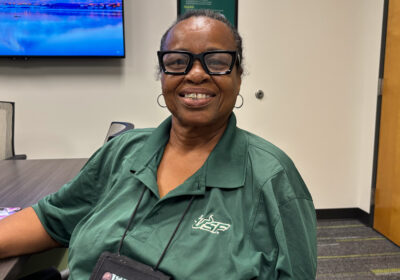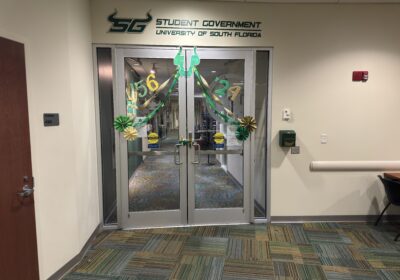Florida Center for Cybersecurity offers veterans ‘New Skills for a New Fight’

The Florida Center for Cybersecurity at USF tracks cyberattacks across the globe in real time, including the attack’s origin and its destination, as pictured here. ORACLE PHOTO / ADAM MATHIEU
After spending months overseas defending their country, some student veterans could now spend a career defending organizations from cyberattacks back home.
On Wednesday, experts in military affairs and cybersecurity met at JPMorgan Chase in Tampa to announce a new program for student veterans at the Florida Center for Cybersecurity (FC2) located at USF.
Currently in development, the 36-week cyber academy named “New Skills for a New Fight” will aim to prepare student veterans for long-term, high-paying jobs in the cybersecurity field.
Larry Braue, director of USF’s Office of Veterans Services, said the program is a great opportunity for teaching veterans transitioning from the military to civilian employment about getting a job as a cybersecurity professional.
“There are still a lot of opportunities (in cybersecurity) that our students aren’t aware of,” he said. “Who’s ever heard of an ethical hacker that (companies) are hiring for a pay of six figures?”
Beginning next spring, FC2 will select 20 student veterans to create the academy’s pilot cohort at the USF Tampa campus. The academy’s first class will act as a proof of concept for the program, where veterans will develop the skills necessary to prevent and respond to real-world cyberattacks against businesses and organizations.
The pilot class is fully funded by a $300,000 grant from JPMorgan Chase, which will pay for course development costs, tuition fees and building a lab to support the academy at FC2.
Adam Sheffield, FC2’s program manager, said one of the reasons the center created the new program is because of the sheer demand for cybersecurity professionals. As the number of high-profile cyberattacks increases, like those on Sony and U.S. Central Command, the need for people who can defend against them also increases.
“There’s a big supply-and-demand gap when it comes to security professionals in the United States and worldwide,” Sheffield said. “Regionally in Florida, you’re looking (at a demand) anywhere between one and two thousand for this type of skill set.”
Because of this high demand, Sheffield said it is important for the private sector and academia to develop new methods for quickly training security professionals to fill entry-level positions and increase employee supply.
He said veterans are a clear choice for this approach because of the skills they have already developed from their time in the military, which significantly reduce the time it takes to train them.
“In an incident-response role, (these skills are) discipline, a teamwork mentality (and) the fact that a fair amount of them hold security clearances coming out of the military,” he said. “They have a baseline of technical training from their time in service that is very easy to build on to rapidly field cyber practitioners in a short amount of time.”
Sheffield said this demand also plays a role in JPMorgan Chase’s willingness to fund the academy’s pilot class, as the company is looking to increase its own security personnel and will double its security budget in the next year.
“It’s one thing to have an idea,” Sheffield said. “We can think this is the best program out there and that it’s going to be successful … but it’s really not worthwhile to pursue a program if there’s not going to be use for it in the marketplace.”
The cyber academy itself is made up of three phases divided over 36 weeks. Phase one is traditional course work in class, and veterans will take four undergraduate level courses in networking and programming with a focus on security.
These classes are meant to develop the veterans’ skills for phase two of the academy, where they will have five weeks of hands-on training — Monday through Friday — in labs set up for veterans to practice responding to simulated cyberattacks using the tools they would have while working for real-world companies.
Veterans who finish both phases will graduate with an undergraduate certificate and an industry certification before moving onto phase three of the academy — a 12-week internship with one of FC2’s industry partners.
Student veterans who complete the program will also have the ability to work with FC2 to pursue a bachelor’s degree online while working full-time as a cybersecurity professional.
In the future, Sheffield said FC2 will pursue additional funding to continue the academy, as well as increase its class size and offer training for different job roles in the years to come.
Braue said the academy has also led to a partnership between the Office of Veterans Services and FC2, and the office will assist future veterans in the academy with eliminating financial issues and other problems that would interfere with veterans’ completion of the program.
For now, Sheffield said the program will begin accepting applications in the beginning of the fall and will notify applicants of their acceptance in the middle or end of the fall semester.







